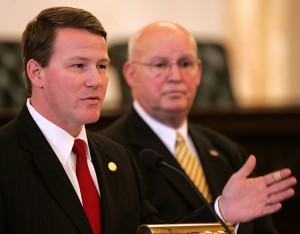
Ohio Secretary of State Jon Husted, left, was formerly the Ohio Speaker of the House. Husted, pictured here, answers questions as former Senate President Bill Harris (R) looks on. (AP Photo/Paul Vernon)
Late Friday, in a last-minute decision that could invalidate votes and delay the outcome of the presidential election, Ohio Secretary of State Jon Husted, a Republican, ordered a change to how provisional ballots are cast in Ohio. When Ohio voters cast provisional ballots, they are required to provide to a poll worker either a social security number, or a driver’s license, or another form of ID. In past elections, the poll worker was required to fill out a section of the ballot stating what kind of ID the voter presented. On Friday, Husted ordered that voters — not poll workers — must now fill out this section of the ballot. If they do not, their vote will not be counted.
States use provisional ballots whenever there is uncertainty about a voter’s identity or about whether that voter has already cast his or her ballot. Provisional ballots are counted after regular ballots, but, in a close presidential election, still come into play determining electoral college votes.
Husted’s order came late in the game. Early voting by regular ballot began in Ohio on Monday, Oct. 29, and according to the Secretary of State’s website, Ohioans could have cast provisional ballots in person as early as Oct. 8 if the voter had moved and not yet registered at his or her new address.
Husted’s staff say that his order is an attempt to comply with a recent court decree pertaining to ID for provisional ballots. But voter advocates say Husted’s order actually goes against the decree, which sought “to ensure no provisional ballot is disqualified when a poll worker fails to complete her designated portion of the envelope.” Voter advocates also suggest that it is in direct conflict with Ohio election law, which states, “the appropriate local election official shall record the type of identification provided.” Voter advocates and the Democratic Party filed a suit against Husted late Friday evening, asking for further clarification from the court.
Monday afternoon, Federal Judge Algenon L. Marbley, the same judge who issued the decree, ordered both sides to appear in court on Wednesday, Nov. 7, the day after the election, to argue their case. Marbley wrote that the case would have to be expedited so that Ohio’s election officials will know how to count provisional ballots that have been filled out incorrectly:
Since this suit bears on Ohio’s conduct of the November 6, 2012 election, it is appropriate to deviate from the Local Rules in order to expedite the briefing schedule and timely resolve the question. The timing is particularly sensitive given the need for Defendant Husted and the State of Ohio to issue instructions to election officials in conformity with this Court’s decision prior to the counting of provisional ballots.
Prognosticator Nate Silver says there’s a 50 percent chance that Ohio will be the deciding state in the presidential election. If the count there is close, Husted’s provisional ballot order could come into question: Should provisional ballots lacking ID information be thrown out in accordance with his order? Were this scenario to play out, legal analyst Andrew Cohen writes:
[T]here will be a great deal of anxious vote counting after Election Day. This scenario hasn’t exactly been a secret. But here’s an actual live dispute for us all to watch. It’s also a reminder that anyone rooting for a resolution Tuesday night (or early Wednesday) ought to hope that it doesn’t all come down to Ohio. If it does, it will be weeks — and one judicial hearing after another — before we have an answer.
Voter advocates also criticized Husted earlier this election cycle when he sought to eliminate early voting. He wasn’t entirely successful, but he did slash the number of early voting weekends from five to one. Early voting is designed to help workers who can’t vote on Election Day cast their ballot on a weekend — and many urban Ohio workers vote Democratic. The consolidated early voting period caused huge lines at polling places, and many waited hours to cast their ballots.
Both political parties are ready for the election to be decided in Ohio, and Democrats especially are prepared to challenge the way in which the votes have been cast and counted. The New York Times reports that Republicans have 70 lawyers ready to be dispatched in Cuyahoga County — the country that contains the Cleveland metro area — and the Democrats have over 600. In total, the Democratic Party has dispatched around 2,500 lawyers throughout the state.
Each side says the other cannot be trusted and, given the likelihood of a tight presidential race, the risks of litigation here — and delayed results — are high.
“If it’s close, you will see both sides running to court,” said Jeff Hastings, a Republican and chairman of the Cuyahoga County Board of Elections.
If you do live in Ohio, here’s a guide on how to make sure your vote gets counted.


